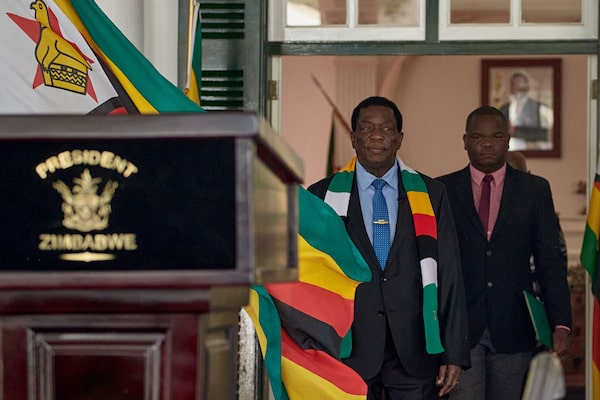
President of Zimbabwe Emmerson Mnangagwa arrives for a press conference at State House in Harare on Aug. 27. Mnangagwa won a second term in office, election officials said Saturday, but the opposition rejected the result of a vote that international observers said fell short of democratic standards.JEKESAI NJIKIZANA/AFP/Getty Images
In an election tainted by widespread voter intimidation and the arrest of independent observers, Zimbabwean President Emmerson Mnangagwa has been declared the winner over opposition leader Nelson Chamisa by a margin of 53 per cent to 44 per cent.
The streets of Zimbabwe’s capital, Harare, were subdued on Sunday after the official result was announced late on Saturday night. There were few signs of celebrations by supporters of the ruling party, ZANU-PF, which has dominated the country since its independence in 1980.
Opposition supporters were also quiet, recalling the soldiers who killed and injured dozens of protesters after the previous election in 2018.
Mr. Chamisa, leader of the Citizens Coalition for Change, said the official result was “a blatant and gigantic fraud” and vowed to find a way to overturn the result. But Mr. Mnangagwa said he was pleased with the election and dared the opposition to try to launch a court challenge.
Mr. Mnangagwa, known as the Crocodile, became president in 2017 after a military coup toppled his long-ruling predecessor, Robert Mugabe, who had led the country to independence. Repression has intensified under the 80-year-old president as Zimbabwe’s economic crisis has deepened, with soaring prices and a crumbling currency.
Two Zimbabwean civil-society groups had deployed thousands of observers to conduct a parallel vote tally of last week’s election to check the accuracy of the official results, but police disrupted the effort by raiding their data centre, seizing their equipment and arresting more than 40 of their volunteers. Many other volunteers were threatened and attacked, according to the groups, the Zimbabwe Election Support Network and the Election Resource Centre.
From the archives: The long and troubling history of Zimbabwe’s new president Emmerson Mnangagwa
The election’s credibility was fundamentally undermined by the “ongoing intimidation and silencing of anyone who can provide verification and transparency,” the groups said in a statement on Sunday.
Similar concerns were raised repeatedly by international observers in recent days, including official African monitoring groups that have traditionally rubberstamped most elections on the continent.
An observer mission from the 16-country Southern African Development Community (SADC) said some voters were intimidated by agents from a “shadowy organization” known as Forever Associates Zimbabwe (FAZ) who took down the names of voters at polling stations before they cast ballots. The organization is widely reported to have links to Zimbabwe’s intelligence agency.
The SADC team, in a preliminary statement on Friday, noted allegations that the FAZ agents were deployed to 36,000 villages across the country, where they put pressure on people to vote “in a particular manner” and warned them that their ballots would be easy to discern.
The mission, describing a range of other problems in the election, concluded that some aspects fell short of the requirements of Zimbabwe’s constitution and election law and SADC’s own democratic principles. The mission was headed by former Zambian vice-president Nevers Mumba.
Zimbabwe’s ruling party and state media reacted furiously to the SADC report, claiming that Mr. Mumba was abusing his role and interfering in Zimbabwean politics. But SADC defended its report and said the attacks on Mr. Mumba were “crude, scurrilous and misleading.”
Rotberg: Zimbabwe has joined the growing ranks of the world’s electoral autocracies
Other observer groups reached the same conclusions as SADC. Former Nigerian president Goodluck Jonathan, who headed a monitoring group from the African Union, said the activities of FAZ at polling stations should be considered “criminal offences.”
The Carter Center, a U.S.-based monitoring group, said the election “took place in a restricted political environment” and its administration “lacked independence and transparency in key areas.” Instead of passing electoral reforms, Zimbabwe’s parliament had targeted civil society and silenced the government’s political opponents in the months leading up to the vote, it said.
United Nations Secretary-General Antonio Guterres was closely following the election and was “concerned about the arrest of observers, reports of voter intimidation, threats of violence, harassment and coercion,” according to a statement released by the UN on Sunday.
In the streets of Harare, many voters said the election was unsurprising and predictable. “The results were manipulated to benefit the ruling party,” said Trust Mabhena, a 37-year-old school teacher.
“There are no celebrations in the streets because the election results do not reflect the will of the people,” he told The Globe and Mail. “It’s a mockery of democracy.”
Meliwe Shoko, a 28-year-old shopkeeper at a clothing store, said she hadn’t bothered to vote in the election because the ruling party “steals every election.” She said Mr. Mnangagwa “controls everything” and his ruling party sends its members to extort money from shops such as hers in every election campaign.
One supporter of the ruling party, 46-year-old vegetable vendor Alice Mucheri, said the party is too powerful to defeat. “Other parties will be formed and die and perish, but ZANU-PF is a giant that cannot fall in any circumstances,” she said.
 Geoffrey York
Geoffrey York